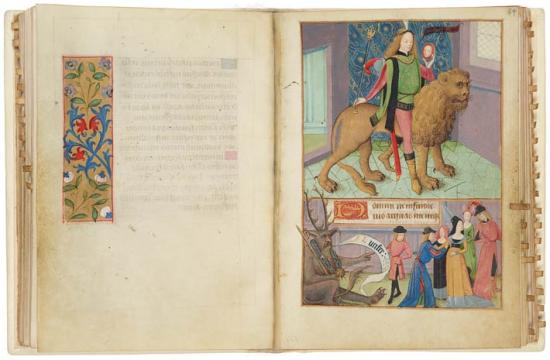The simplest argument in favour of the conventional view; that pride in this sense is a use of the same word that refers to the quality of being proud, is that it is in keeping with many other such words for animals:
A shrewdness of apes.
A sleuth of Bears (sloth of bears appears to be slightly later).
A richesse (or richness) of martens.
An uncredibility of crocodiles
These are similarly qualities that involve a noun normally taken to refer to a quality humans may possess, and turning them to use as a collective noun.
All four here are from the 1486 Boke of Seynt Albans, as indeed is "pride of lions". The Modern Language Association of America apparently has a record of the use from around 1450, so the Book of St. Albans is not the first, but was one of the first records.
And considering that it also has such entries as "a doctrine of doctors" and "A disworship of Scots" it's clear that the practice of creating humorous versions of such collective nouns ("a click of web developers", "a promise of politicians", etc.) is nothing new. Humour has in fact always been part of the inspiration behind such names. More generally than that, there was always an element of word-play.
And there was again when such words were revived, having dropped out of use for several centuries but then revitalised because they are amusing, and because they provided a sort of vicarious knowledge; things one can know whose value is largely in enjoying knowing them. (Most subcultures today have these, the person who looks down upon the person who can recollect the comic book issue in which a particular superhero made his first appearance taking pride in knowing the scores of every final in a particular sport, and so on).
There are some such nouns that relate more directly to the behaviour of the actual animal itself, than to such personalised traits, so your suggestions cannot be fully ruled out.
However, these "traditional" collective nouns came into being in 15th century England, where a lion was much more often seen on a flag or a crest, than on a savannah, and where it was indeed associated with pride.
Lions were previously used as an image of the sin of pride, as in this Book of Hours from circa 1475 where a personification of Pride rides on a lion's back:

This makes the idea that the association was indeed with the quality of being proud, the most likely.
Cut the cheese:
- (Slang) to release intestinal gas. (Crude. Use caution with the topic.) - Who cut the cheese? People who cut the mustard in the car have to get out and walk.
(TFD)
It’s difficult to track down the origin of this expression, but according the The Phrase Finder:
“Cut” has been used for flatulence since the 1800s, as testified by several sources and continued today in the mainly American expression, “To cut a fart”.
Rude Boy says cheese was introduced to the mix in the late 1960s, citing the Dictionary of American Regional English.
The following example is from
The Definitive Fart Book - 1961:
- Funny, everybody does it, but nobody wants anybody to know they're the somebody who: Cut the Cheese, Passed the Gas, Let One Rip, Shot a Bunny, Copped a Pop, Popped a Bubble, Cranked a Smoker, Pinched an Egg, Split the ...
Probably the simple and more intuitive answer is the right one, referring to the strong odour that emanates when the rind is cut on some of the more pungent cheese varities.

Best Answer
The expression is quite old as a term for sightseeing, and appears to have originated in the form "see the lions." J.S. Farmer & W.E. Henley, Slang and Its Analogues Past and Present (1896) has this entry for the earlier term:
The Greene reference is to "the Palmer's Story" in Robert Greene, Never Too Late (1590):
Evidently "to see the lions" was already an old proverb in 1590. A playful allusion to the proverb evidently appears in Ben Jonson, The Alchemist (1610) at a point in the play where two cheats are attempting to defraud a supposed Spanish nobleman, newly arrived in London from the continent:
An editor's note by Francis Mares from a 1967 edition of the play offers this discussion of the line:
I couldn't find the relevant instance in Webster's The White Devil, so I don't know why the editor mentions it.
Although the first sentence that Farmer & Henley attributes to the Francis Grose, A Classical Dictionary of the Vulgar Tongue is indeed present in the first edition (1785), the sentence about the April Fool's day washing of the lions first appears in the second edition (1788).
The earliest occurrence of the form "do the lions" in the relevant sense that I've been able to find is from "Chitchat upon Washington Styles" in Godey's Lady's Book (Philadelphia, February 1853):
From "Musical Correspondence," in Dwight's Journal of Music (Boston, February 13, 1858):
From "An Honest Arab" in Harper's Weekly (New York, April 7, 1860):
And from "A Visit to the Engine Room," in The Cabinet (Melbourne, November 9, 1861):
Interestingly, the three earliest middle-nineteenth-century matches for "do [or doing] the lions" occur in U.S. publications, and the fourth in a special Australian publication, whereas the earliest "see the lions" instances clearly come from English sources.
Conclusions
According to Francis Mares, writing in 1967, the expression "to see the lions" refers to visiting the menagerie in the Tower of London, where lions were kept from (it would seem) at least the 1500s until 1834. This destination was such a popular tourist attraction that "see the lions" was proverbial for "sightseeing" by 1590. The altered wording "do the lions" in the same sense of "sightseeing" is of obscure origin, but is recorded in U.S. sources by 1853.